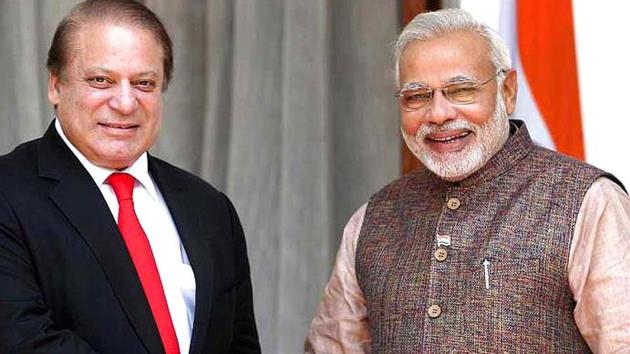Left unsaid at Raisina Dialogue: Little chance of improvement in India-Pak ties
For both India and Pakistan, ties with each other are linked to domestic politics in some way or other.
The New Year has begun on a familiar template for India-Pakistan ties: talks and terror cannot go together, as Prime Minister Narendra Modi put it.

In other words, the possibility of resuming a bilateral dialogue remains slim, at least till the assembly elections in five states are over.
The reasons are simple: For both India and Pakistan, ties with each other are linked to domestic politics in some way or other.
Modi was unambiguous while laying out his government’s policy towards Pakistan at the Raisina Dialogue, a conference on geopolitics hosted by India annually.
“I had also travelled to Lahore. But India alone cannot walk the path of peace. It also has to be Pakistan’s journey to make. Pakistan must walk away from terror if it wants to walk towards dialogue with India,” Modi said at the opening session on Tuesday.
Any move by Delhi that would appear to be soft on Pakistan is not something the Modi government can afford at this time, especially after a series of terror strikes India blamed on the neighbour.
For the nationalist BJP government, its carefully crafted credentials of dealing with Pakistan and terrorism firmly are a unique selling point to voters in the five states. The government projects its Pakistan policy as an indicator of its decisiveness and diluting it ahead of the elections wouldn’t be politically prudent.
The Modi government has been on a diplomatic offensive to isolate Pakistan diplomatically and it is using every available forum to achieve the goal.
The same holds true for the Pakistan government led by Prime Minister Nawaz Sharif.
Pakistan will go for general elections in 2018 and Islamabad cannot afford to appear to be buckling under pressure and give in to what it says are “unreasonable demands” by India, such as putting conditions on talks and talking tough on the Indus water sharing issue.
The Pakistan army, which has always played a crucial role in determining the country’s India policy, has just got a new chief and it would take a while to know how this would play out in the internal dynamics of the neighbouring country.
During the last elections, Sharif had batted for better ties with India.
Though elections in both countries cannot be fought in the name of each other, the complex history of their relationship shows one thing: There is no escaping the domestic politics in their ties.
The best possible icebreaker to end the logjam appears to be the neighbour hosting the SAARC summit, which was postponed after India pulled out citing Islamabad’s continued support to militant groups.
Not so long ago, Modi had invited all SAARC leaders to his swearing-in ceremony. And then he made a high-risk, unannounced visit to Lahore, which many believed could be a game-changer in bilateral ties. Pakistan responded by allegedly sending more terrorists across the border.
Islamabad’s tactics this year could very well determine the future of the ties between the two countries. Best fences always don’t make good neighbours. Dialogue and trust do.





